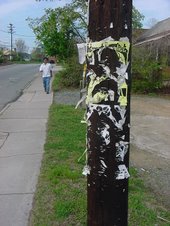 The Chapel Hill News
The Chapel Hill NewsJune 26, 2002
News in Review
Page A2
By the end of the year, utility poles around Chapel Hill may be sporting legal flyers and posters.
On Monday, the Chapel Hill Town Council backed a request by Erik Ose, a local activist and businessman, to allow signs on utility poles, a practice that is now banned.
Duke Power opposed the change in policy, citing nails and staples for causing "a degradation of the integrity of the wood" and making it less safe for crews to climb the poles and repair lines.
Council member Pat Evans opposed the signs for safety reasons, as well as aesthetics.
"There will be signs that spring up addressing every major issue and commercial venture," Evans said. "Allowing all kinds of signs to be posted in all corners of the community is the wrong direction to take."
But the majority of the council disagreed.
"I don't think there is going to be a crisis of posting around town," council member Mark Kleinschmidt responded.
The council voted 6-3, with Evans, Jim Ward and Flicka Bateman dissenting, to ask the town attorney to bring back ideas on how to change the ordinance in the fall.
If the ordinance changes, Public Works staff members would take the signs down at regular intervals in much the way they clean up the town-owned kiosks.

